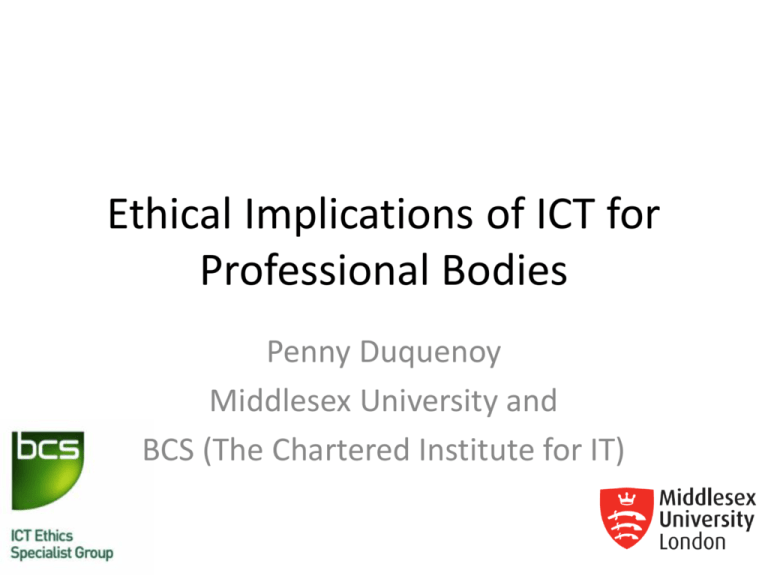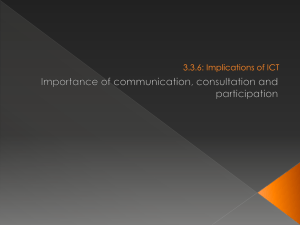Social, Professional and Ethical Issues in Information Systems
advertisement

Ethical Implications of ICT for Professional Bodies Penny Duquenoy Middlesex University and BCS (The Chartered Institute for IT) Considerations Ethical implications ICT -> Professional bodies –> Obligations and responsibilities Role and responsibilities of professional bodies • Promote [study and practice] • Safeguard [users, and the public] • Educate [professionals, and raise awareness public] • Maintain standards [benefit society] 2 Case 1: BCS, The Chartered Institute for IT … promote the study and practice of Computing and to advance knowledge and education therein for the benefit of the public. (a)to establish and maintain appropriate standards of education and experience (b) to establish and maintain a sound ethical foundation for the use of computers, data handling and [IT] systems; … (f) to prepare, print and publish criteria for the teaching of, and training in, Computing and its applications; (m) to promote, establish and support standards and codes of practice for the: handling, storage, acquisition, transmission, processing, protection and display of data relating to Computing and the information contained therein; 3 Extracts from BCS Royal Charter, full version available from: http://www.bcs.org/category/6038 Case 2: ACM (Association of Computing Machinery) … delivering resources that advance computing as a science and a profession; enable professional development; and promote policies and research that benefit society. [1] 3. ORGANIZATIONAL LEADERSHIP IMPERATIVES. [2] As an ACM member and an organizational leader, I will .... 3.1 Articulate social responsibilities of members of an organizational unit and encourage full acceptance of those responsibilities. Because organizations of all kinds have impacts on the public, they must accept responsibilities to society. [Note: In this context "organizations" are [corporations, govt agencies …] as well as volunteer professional organizations. Extracts ACM Code of Ethics. Copyright ACM. [1] www.acm.org/about/ [2] www.acm.org/about/code-of-ethics ACM Code of Ethics [applies to members of ACM] 1. General Moral Imperatives 1.1 Contribute to society and human well-being Key words: • quality of life of all people; • protect fundamental human rights; • respect the diversity of all cultures; • minimize negative consequences … products … will be used in socially responsible ways; • meet social needs, avoid harmful effects to health and welfare. 1.2 Avoid harm to others. 1.4 Be fair and take action not to discriminate 1.7 Respect the privacy of others Extracts from ACM Code of Ethics. Copyright ACM www.acm.org/about/code-of-ethics 5 Ethical Implications of ICT for Professional Bodies? • ICT has a direct impact on the general public (of all ages) – to benefit/to harm – economically, politically, socially, physiologically. • ICT professionals, as experts, have a duty of care • Therefore, professional bodies (in representing professionals) must have a duty of care – a professional body must actively promote the standards they promise by supporting professionals and professionalism … 6 How? Education and training – not just knowledge – also … Ensuring the education of ICT professionals: •Provides an understanding of the role and responsibilities of a professional •Sets out the expectations of professionalism •Equips professionals with a capability for recognising ethical challenges (in work practices/processes) and ethical/social impact of technology products; and making ethical judgements 7 Supporting professionalism in practice • How does a professional society support a professional facing an ethical dilemma? • What guidance, if any, on conflicts to a Code of Ethics? (e.g. public safety/security –vduty to relevant authority [BCS Code]) • Who is responsible for what? • Limits of responsibility? • Complex systems? – see next slide! 8 It’s complicated! Source: from presentation by Robin Duke-Woolley for BCS ICT Ethics SG, March 2012. BIS3328 2012-13 Slides available at: http://www.bcs.org/content/ConWebDoc/43750 9 Ethical analysis: Internet of Things Public Consultation The invisibility of the IoT-technology may obfuscate its exact workings to the user: there will be a dissonance between what a user knows about what happens, and what actually is happening. Different stakeholders will have different epistemic requirements with respect to interaction with the technology. It can be argued that informed consent by IoT users or indirect stakeholders can be difficult if technical knowledge is required. The question then may arise how information on the working, effects and risks of the technology should be presented. This holds especially since users form a diverse group with different choices, needs, knowledge and epistemic capabilities. Transparency might be difficult to achieve even for experts and therefore taking and assigning responsibility becomes problematic. BIS3328 2012-13 http://ec.europa.eu/digital-agenda/en/news/conclusions-internet-things-public-consultation 10 Professional Codes of Conduct Statement of Ethical Principles, Royal Academy of Engineering http://www.raeng.org.uk/societygov/engineeringethics/pdf/Statement_of_Ethical_Principles.pdf Professional issues: Relevant to emergent technologies (e.g. autonomous systems) there is a particular duty of engineers to: •identify and evaluate and, where possible, quantify risks. •be aware of the issues that engineering and technology raise for society, and listen to the aspirations and concerns of others. •actively promote public awareness and understanding of the impact and benefits of engineering achievements. https://www.raeng.org.uk/societygov/engineeringethics/pdf/Autonomous_Systems_Report_09.pdf 11 References Conclusions of the Internet of Things public consultation - 28/02/2013 Section 2: IoT Architecture and Section 3: Internet of Things Factsheet Ethics Available at: http://ec.europa.eu/digital-agenda/en/news/conclusions-internet-things-public-consultation Presentation by Robin Duke-Woolley for BCS ICT Ethics SG, March 2012. “Ethics and the Internet of Things – an oxymoron?” Slides available at: http://www.bcs.org/content/ConWebDoc/43750 European Group on Ethics - Opinion No. 26: Ethics of Information and Communication Technologies. Brussels, 22 February 2012 http://ec.europa.eu/bepa/european-group-ethics/docs/publications/ict_final_22_februaryadopted.pdf The Royal Academy of Engineering and the Engineering Council UK. Statement of Ethical Principles (SEP) for engineers. • http://www.raeng.org.uk/societygov/engineeringethics/pdf/Statement_of_Ethical_Principles.pdf






